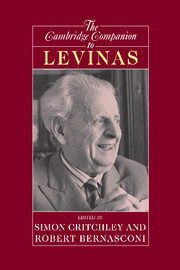Book contents
- Frontmatter
- 1 Introduction
- 2 Levinas and Judaism
- 3 Levinas and the face of the other
- 4 Levinas's critique of Husserl
- 5 Levinas and the Talmud
- 6 Levinas and language
- 7 Levinas, feminism and the feminine
- 8 Sincerity and the end of theodicy
- 9 Language and alterity in the thought of Levinas
- 10 The concepts of art and poetry in Emmanuel Levinas's writings
- 11 What is the question to which 'substitution' is the answer?
- 12 Evil and the temptation of theodicy
- Bibliography
- Index
9 - Language and alterity in the thought of Levinas
Published online by Cambridge University Press: 28 May 2006
- Frontmatter
- 1 Introduction
- 2 Levinas and Judaism
- 3 Levinas and the face of the other
- 4 Levinas's critique of Husserl
- 5 Levinas and the Talmud
- 6 Levinas and language
- 7 Levinas, feminism and the feminine
- 8 Sincerity and the end of theodicy
- 9 Language and alterity in the thought of Levinas
- 10 The concepts of art and poetry in Emmanuel Levinas's writings
- 11 What is the question to which 'substitution' is the answer?
- 12 Evil and the temptation of theodicy
- Bibliography
- Index
Summary
A work of literary translation, says Walter Benjamin, exists as though stationed outside of a forest it cannot enter and as calling into ‘the wooded ridge’ in order to receive an echo that gives back in its own language that which reverberates in the alien one. The work of Levinas is such an invocation, an effort at translating incommensurables, a troping of that which cannot be troped, an unassimilable excess that resists apprehension in propositional discourse. This ‘more’ that remains beyond spoken or written language is the otherness of the other person, an otherness that cannot be configured as a content of consciousness but that issues an imperative that obliges me to assume responsibility for the other.
Like the otherness of another human being, the more of the infinite overflows the idea that attempts to contain it, its superabundance both traduced and expressed in acts of translation into the language of philosophy. The other human being in the sanctity of her or his manifestation as a human face and the infinite as an ideatum whose excessiveness goes beyond any idea we can have of it can only be the objects of an insatiable desire. Any translation (always already merely putative) demands a contraction of this content so that on the one hand it is communicated and on the other retains its ethical authority, the exteriority from which it derives. In order for there to be translation, there must be a pre-existent store of concepts, a speculative language without which translation could not come about, yet one that is disrupted by the more, the exorbitance, of an alterity that is beyond it.
- Type
- Chapter
- Information
- The Cambridge Companion to Levinas , pp. 188 - 205Publisher: Cambridge University PressPrint publication year: 2002
- 22
- Cited by



